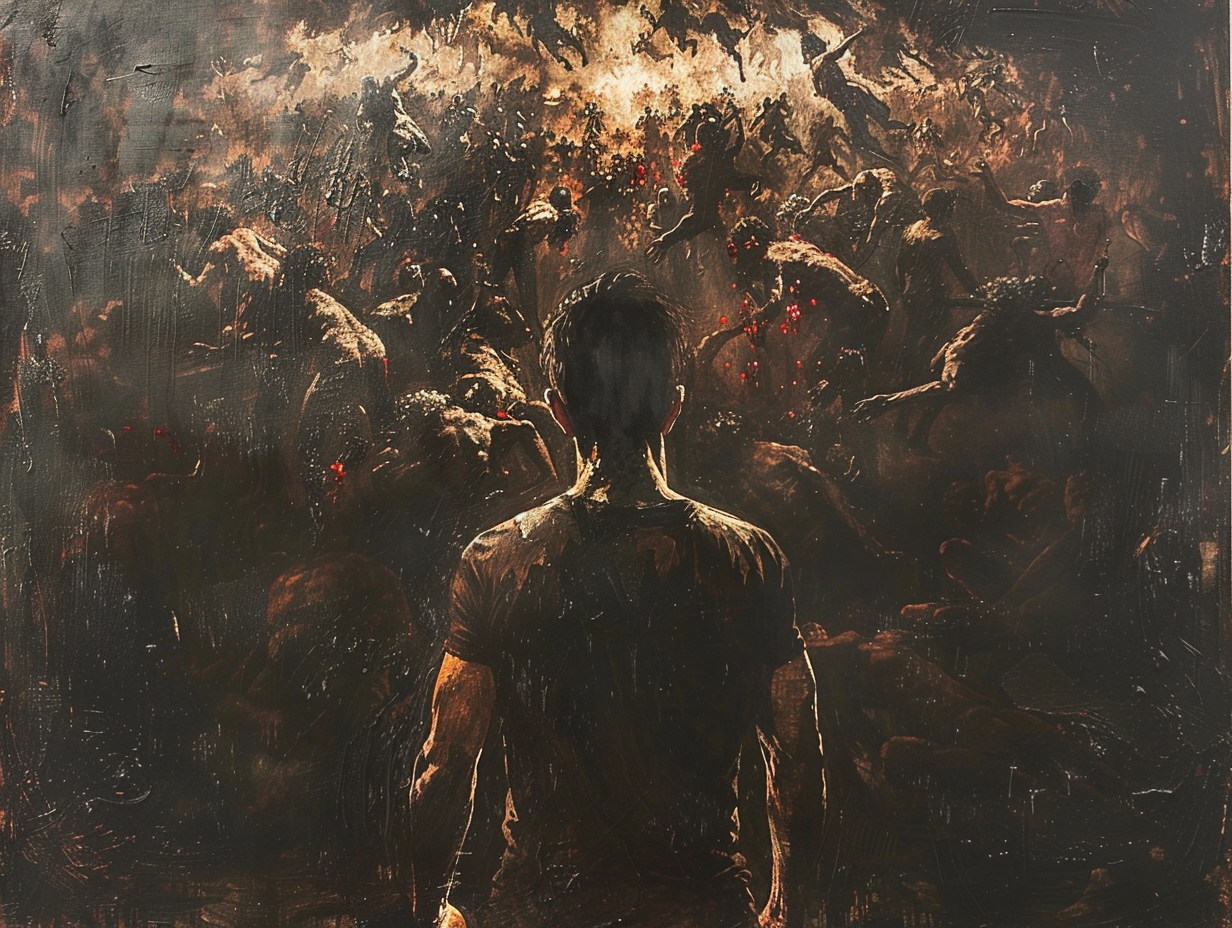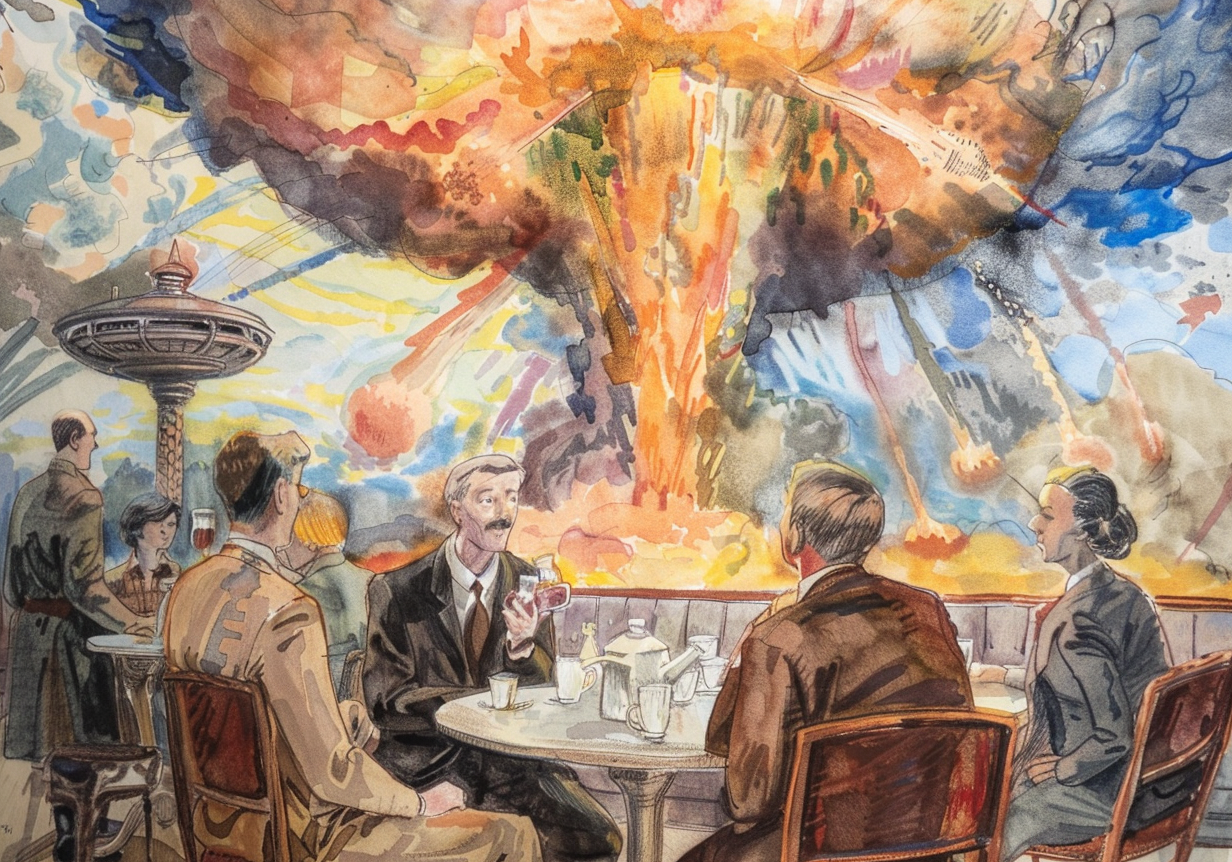
This essay includes excerpts from my book Outsourcing Consciousness: How Social Networks Make us Lose our Minds, set to be published in mid-2025. To stay up-to-date and get access to preview versions of chapters, be sure you are registered for the Epsilon Theory newsletter or subscribe to Epsilon Theory here.
What a stupendously stupid month it has been.
As time marches on and we memory-hole July 2024, we will lie to ourselves and pretend that everything that happened was a fringe thing. We’re still in the moment, at least for now, so we can tell the truth. None of this was fringe. A lot of liberals convinced themselves very quickly and actively promoted the view that the attempted assassination of Donald Trump was staged. A lot of conservatives convinced themselves that Joe Biden was on his deathbed. Maybe he was already dead.
It is over a week later now, and MSNBC is still hosting breathless segments on whether it was a bullet or a shard of glass or shrapnel that sliced the ear of the former president. Forensically interesting, I suppose. Maybe it was shrapnel! But it’s only really relevant for continued discussion if you suspect or would rather like people to speculate that it might be evidence of a staged or exaggerated attack. And many suspected exactly that. More than a third of Democrats, which is a bit more than the popularity of Q-Anon theories among Republicans. If you happened to push back ever so lightly on the idea that there is any evidence of a staged assassination, the responses you would have received were where things really started to go off the rails. Don’t you think it’s strange that they won’t release more information about how Mr. Trump was injured? Wasn’t it convenient for him to have such a perfect opportunity for that triumphant fist pump? With everything that has happened, do you really think it is above his backers to stage a false flag to get the Civil War they clearly want? Did you see that picture of him golfing the next day (weeks before, but who’s counting?) without a bandage? Are you really aligning yourself with the people showing up at rallies with matching bandages? Are you really going to cede the moral high ground on political violence after January 6th and years of Trumpian “rid me of this turbulent priest” rhetoric? Are you really going to take their side?
Meanwhile, mainstream conservatives continue to do their best Columbo routines, zooming in on President Biden’s watch as if it were a new damned Zapruder film, all to conjure explanations for why the White House might be lying about how live his address to the nation really was. If you didn’t learn your lesson the first time and pushed back just as lightly on the notion that there’s any evidence of Biden being in hospice care or literally dead, you’d have been struck once again by non sequitur responses. Wait, you’re really saying that you don’t think the media has been propping up Biden and pretending he wasn’t in decline for years, only to change their tune when the lie stopped being believable? You’re saying you don’t think it’s weird at all that he posted his withdrawal from the race on Twitter with a weird underlined signature and disappeared for three days? You’re saying we haven’t been gaslit? That the media isn’t willing to cover for him again and again? That Democratic money that pulls the strings isn’t effectively staging a coup to replace the will of primary voters with the aims of moneyed globalist elites? Are you really going to take their side?
It is almost as if “Biden is on his deathbed!” and “It wasn’t even a bullet!” aren’t really statements that can be evaluated on their own. It is almost as if – in a matter of days! hours! – we transformed them into symbols, imbued with all manner of other beliefs, statements, ideas, relationships, and associations.
We can look at all of this critically, of course. We can say that believing that Biden is just old and probably sleeping off COVID doesn’t say anything about our views on media, political violence, politics, or anything else. We can say that thinking this was a normal, scary attempted assassination doesn’t say anything about our views on media, political violence, politics, or anything else. But if we do, we’ll quickly find ourselves on an island. But this is insane, isn’t it? Are simple statements of fact uttered in a public setting all now destined to be post-processed into complicated symbols we are hopelessly incapable of unraveling without the Rosetta Stone of a political tribe to translate them? Are we losing our minds?
Yes, every public statement is now an inscrutably complex symbol. And yes, we are losing our minds, figuratively and literally.
The reason for both is the same.

Our Symbolic Selves
Symbol is one of those words that can mean a lot of different things. Most of the time, I think we use it to describe a thing which stands for another thing to somebody. To the patriot, the flag might stand for a country or the ideals it represents. To the protester, a raised first might stand for solidarity and the power of joint action. To Dan Brown, literally anything on the planet might represent the sacred feminine. And yes, all of those are symbols. Still, the idea of a symbol I mean in the context of the bizarre cultural moment we are enduring is just a bit different. I mean a thing which stands for another thing to somebody, the meaning of which is derived from cultural reinforcement. It’s a minor distinction, but an important one. It helps to explain why you and I are so drawn to symbolic representations, why we can acquire them so quickly, and how different modes of communication change the way that they affect how and what we think.
The best book ever written about symbols in this sense isn’t really about symbols at all. It’s a book about the co-evolution of the human animal with human language. The Symbolic Species by Terrence Deacon is not an easy read, but it is extraordinary with far-reaching implications. The most important of those implications is a convincing case not only for why humans developed their peculiar capacity to acquire and use language, symbols, and stories, but how language, symbols, and stories themselves evolved to become easier for us to acquire, understand, and use1.
Deacon’s text is also especially useful in that it (correctly) frames language as a symbolic system. That’s a highfalutin way of saying that the symbols from which language is built – which includes things like words, letters, and grammatical structures – cannot be understood in isolation and cannot be acquired from the bottom up through brute force. Their meanings are functions of a network of relationships with other symbols. It is this structure which permits Deacon to propose an alternative to the “universal grammar” so beloved of Chomsky and others. He suggests that humans are uniquely capable of acquiring language not because hard rules of recursion and syntax are literally genetically coded into our brains, but because the plastic childhood mind is uniquely capable of perceiving the structure of a network of relationships among symbols that would be unlearnable by brute force memorization of rules and conventions.
It is an especially compelling argument when we consider the evolutionary imperative for systems to evolve to become acquirable over much shorter horizons than those over which biological evolution takes place. This is why that pedantic little modification to the definition of symbol was necessary. A lot of things which represent other things don’t really need cultural reinforcement for us to understand them. It doesn’t take cultural reinforcement to know that a nude statue of a voluptuous woman – a figure which unsurprisingly accounts for almost all of humanity’s oldest discovered symbols – means “a woman” or “women.” It looks like what we say it means. Depending on our experience with human activities which result in babies, we probably don’t even need cultural reinforcement to know that such a statue means “fertility.” It looks like a thing which does a thing we say it means. These signs, as Charles Sanders Peirce called them, will survive us no matter how blithely we waltz into the indifferent buzzsaw of nature. On the other hand, the signs which require human society to mediate their meaning – symbols – are always a single generation away from dying forever. When a generation of children failed to acquire the structure or symbols of a human protolanguage, it died forever. When the last member of a tribe to remember a story died, the story died forever too. Again, given the massive advantages of structured language and stories, the evolutionary pressure on language and stories to evolve to become more easily acquired and more easily spread would have been remarkable.
That capacity to be acquired and spread would have been aided by similar pressures on human biological evolution, even if the adaptations of an animal emerge over geologic timescales in comparison to the rapid adaptations of language. One of most powerful results of the co-evolution of your brain and human communication, for example, was a disproportionately influential prefrontal cortex relative to other apes. The prefrontal cortex is one of the most important brain structures responsible for executive function, working memory, and inhibitory control. In terms of symbolic systems like language and story, it is the part of our brain that is responsible for pushing the pause button on seeing things literally so that we might consider what else things might mean. Nothing about the human brain is really this simple, but you would not do very wrong to say that you owe much of your symbolic nature to your very special prefrontal cortex.

And it is special. In the million and a half years or so it took to evolve from Homo erectus into the behaviorally modern Homo sapiens, an already highly encephalized brain grew and became more complex. The frontal lobe, including the prefrontal cortex, grew much more rapidly and changed its shape more than the rest of the brain2. On size alone, the prefrontal cortex of Homo sapiens is about 12.5% larger than would be expected based on the size of the human brain in comparison to other great apes3. But the neurons in the prefrontal cortex also exhibit some of the densest dendritic branching, among the highest spinal densities, and some of the most disparate and extensive connections to other brain regions4. Axonal branching patterns – the neural connections sent from neurons in the prefrontal cortex to other areas – demonstrate similarly exaggerated density. What’s more, there is some evidence that these traits were among those which grew the most during human evolution5. In simpler terms, when your brain is at its most plastic, the neurons in the enlarged part of your brain that most influences your cognition to imagine the possible meanings of symbols work desperately to connect with as many other functional areas of the brain as possible.
Your brain evolved to be shaped and influenced by a functional region which imagines the possible meanings of things, and the systems of symbols, abstractions, words, and stories to which you are subjected every day evolved to be as easily acquired and spread by that brain as possible.










Rusty, this piece definitely represents an evolutionary cornerstone in ET thinking. I look forward to some study time with the print version to develop a better understanding. What Candide said to Pangloss at the end of Voltaire’s Candide. “We must cultivate our own Gardens” continues to ring true if for no other reason than to escape the craziness…
Rusty,
Wow. Thank you for this manifesto.
This will take a long time for me to feel noseblind. Thank you for all the foot notes
Understanding your commentary is how we get across the gyre.
From my personal bottom up perspective, my feeling is much much greater than my thinking.
A few quotes come to mind.
“To say that animals evolved into man is like saying that Carrara marble evolved into Michelangelo’s David. Speech is what man pays homage to in every moment he can imagine.”
― Tom Wolfe, The Kingom of Speech
“The power of the human brain was so far beyond the boundaries of natural selection that the term became meaningless in explaining the origins of man.”
― Tom Wolfe, The Kingom of Speech
The Kingdom of Speech is a critique of Charles Darwin and Noam Chomaky
written by Tom Wolfe (I know, it is that Tom Wolfe)
In the book, Wolfe criticises Darwin and his colleagues for taking partial credit from Alford Wallace for the theory of evolution and ignoring Wallace’s later work on the theory. Wolfe then criticises Noam Chomsky for dismissing Daniel Everett who disputes Chomsky’s claim that all languages are based ultimately on a hard-wired mechanism known as the language acquisition device, (LAD). Wolfe argues that speech, not evolution, sets humans apart from animals and is responsible for all of humanity’s complex achievements.
From goodreads dot com
We do not merely perceive objects and hold thoughts in our minds; all our perceptions and thought processes are felt. All have a distinctive component that announces an unequivocal link between images and the existence of life in our organism.
-Antonio Damascio
You still have only one self and one identity. However, self, identity and personality are not things, they are not objects, and they certainly are not rigid. Instead, they are biological processes built within the brain from numerous interactive components, step by step, over a period of time.
-Antonio Damascio
Looking for Spinoza: Joy, Sorrow, and the Feeling Brain, Harcourt, 2003
Feeling and Knowing: Making Minds Conscious, Pantheon, 2021
And my old standby,
We live mythically and integrally as it were but we continue to think in the space and time patterns of the pre-electric age.
-Marshall McLuhan
feeler jim
I wonder if there is something to be said here on the matter of cognition. Like maybe we could foster, or tend-to, cognition as an intentional act of counter balancing the Nudge.
Thanks Rusty for being the zeitgeist of our times. A few thing to add,
Thanks Rusty for the great work to pull these thoughts together and get them out to others.
I’m personally concerned with how I feel like I’m losing my own mind more and more these days. I sometimes feel like my own mind is literally dying of consumption and my relationships with the people around me are often paying the price.
Mind you, it’s not like the content I consume all day isn’t great stuff. Most if it is great! It’s just that I seem to be losing the line between consuming content and actually doing something productive with it. My mind is more active than ever but I’m not sure to what purpose.
It also makes me wonder what mind actually is given that it’s state can be heavily so influenced by its local environment. It’s much more environment dependent than I would like to believe.
Great points Richard IMO.
I’ve accepted/embraced the role of environment on my mental outlook a long time ago. Saint Augustine I am not. Heck, that’s why I moved to northern New England in the first place (from Northern VA). Perhaps that’s why we enjoy travel so much - it undeniably helps you to live in the present and discover new things.
For example, if you ever get bored fishing at Smith Mountain Lake you could try (if you have the time) a more wilderness experience in far eastern Maine. Many more Smallmouth bass too!
You might not need fret that you aren’t doing something productive.
If you are paying $$ for the content, you are adding to Gross Domestic Production.
Cui bono is interesting, but is pleasure not the end goal of utility?
It is interesting that you quote the inventor or what was once called the new journalism and could be called narrative journalism. My 20yr old son is reading Bonfire of the Vanities at the moment and its been fun discussing it with him. When I think about the Nazi rallys and how Hitler used the radio and broadcast technology it reminds me that every tyranny has discovered ways to harness new technology. Lets hope we’ve discovered the power of narrative journalism before them.
Ward,
Thank you. Your note made my day.
American Edward Bernays wrote Popaganda in 1928. His work, I believe, influenced Hitler and later Madison Avenue’s grip on capitalism and politics.
Ask your son to use ChatGPT to write a 300 word essay comparing Bernay’s Propaganda with Wolfe’s Bonfires of the Vanities using wikiquotes as the data source.
Post the results.
Jim